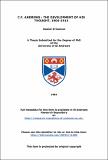Files in this item
C.F. Andrews : the development of his thought, 1904-1914
Item metadata
| dc.contributor.advisor | Fleming, JOhn | |
| dc.contributor.author | O'Connor, Daniel | |
| dc.coverage.spatial | xi, 406 leaves | en_US |
| dc.date.accessioned | 2017-06-26T13:11:51Z | |
| dc.date.available | 2017-06-26T13:11:51Z | |
| dc.date.issued | 1981 | |
| dc.identifier | uk.bl.ethos.667195 | |
| dc.identifier.uri | https://hdl.handle.net/10023/11086 | |
| dc.description.abstract | “The present work has been approached as a Mission Study. This is a wide enough category, but if I have had a model in mind, it has been E.J. Sharpe’s study of the thought of J.N. Farquhar, published in the series, “Studia Missionalia Upsaliensia” ¹⁰ I have tried to take account of J. Kent’s appeal, in an essay on “The History of Christian Missions in the Modern Era”, to take secular history more seriously “for its own sake”, than was the case in an earlier generation of mission studies.¹¹ Not that any other study of Andrews would have made much sense, so active and perspicuous a participant was he in that history. I have also suggested that it is helpful to see Andrews within the special context of The Cambridge Mission to Delhi and its distinctive theology of mission, and indeed, my argument that this theology found a new authentication in his work during these years, provides a framework to the thesis. Two omissions ought to be justified, I have not attempted an elaborate review of the 19th century background of “Protestant missionary thought”, desirable as this might have been, because this has been done very thoroughly in the first part of Sharpe’s study referred to above. Sharpe’s omission, however, of the Cambridge Mission to Delhi and of “the missions of the Catholic tradition” (“with one exception, the Oxford mission to Calcutta”) because they lie to “one side of the dominant Evangelical stream of missionary thought”, provides a convenient space in which to establish the distinctive approach of the Delhi Mission.¹² Another omission is any general survey of the history of the Cambridge Mission, partly because a useful one is already available, by F.J. Western, but partly also because the essential context of Andrews’ work was the completely new situation that developed almost immediately after his arrival in India, for which the earlier activities of the Mission provided no precedents. The sources used are exclusively English sources for English was almost exclusively the language in which the matter of Indian nationalism at this stage, and of Hindu reformation and of much of progressive Indian Islam occurred.¹³ For the unpublished sources for this study, I have relied largely on the well-known collections, in particular the archives of the C.M.D. and of S.P.G., the papers of two of the viceroys, Minto and Hardinge, and the correspondence of Tagore, Munshi Ram and Gandhi. The published sources have been in many ways quite as important as the unpublished, for Andrews became, from late 1906, something of a compulsive communicator in the nationalist press, and the evidence for his developing thought is to a considerable extent in print here. Many of these published sources are excessively rare. Thus, for example, there is, in India, only one surviving run of the St. Stephen's College Magazine for these years, and the same is true of the journal, Young Men of India, while there is in Britain only one microfilm copy of the nationalist newspaper, the Tribune, so important for this study. Because of the interest of much of this source material, and a wish to make it more accessible, I have allowed the notes to tend towards the copious. A full account of these sources is given in the Bibliography. Although, as is said above, Andrews' approach to his work, as representing a sort of realization of a distinctive theology of mission, provides a thesis on which this study is constructed, it is perhaps more important simply to claim a profound intrinsic interest in the story of this "gentle, eager and many-sided saint” ¹⁴ and in his perception of the necessities, still far from fulfilled, of a Christian response to the Asian revolution.” – from the Introduction. | en_US |
| dc.language.iso | en | en_US |
| dc.publisher | University of St Andrews | |
| dc.subject.lcc | BV3269.A65O3 | |
| dc.subject.lcsh | Andrews, C. F. (Charles Freer), 1871-1940 | en |
| dc.title | C.F. Andrews : the development of his thought, 1904-1914 | en_US |
| dc.type | Thesis | en_US |
| dc.type.qualificationlevel | Doctoral | en_US |
| dc.type.qualificationname | PhD Doctor of Philosophy | en_US |
| dc.publisher.institution | The University of St Andrews | en_US |
This item appears in the following Collection(s)
Items in the St Andrews Research Repository are protected by copyright, with all rights reserved, unless otherwise indicated.

